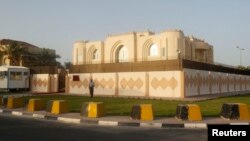The U.S. and Afghanistan’s Taliban have denied media reports that they plan to hold peace talks in Qatar's capital Doha.
"The United States currently has no meetings with the Taliban scheduled in Doha," said a White House official Thusday.
"We remain supportive of an Afghan-led reconciliation process whereby the Taliban and the Afghans engage in talks toward a settlement to resolve the conflict in Afghanistan," added Bernadette Meehan, a spokeswoman for the National Security Council.
A Taliban spokesman, Zabihullah Mujahid, contacted VOA by phone to say there is no change in its policy with regards to holding peace talks with any party because foreign forces are still “occupying” Afghanistan. He rejected the reports as “fabricated and not true.”
Both were responding to international media reports that the Taliban is preparing to meet with U.S. representatives in Doha as early as Thursday.
The Taliban’s political office is located in Doha where its representatives make contact with the international community. Some reports also quoted unnamed Pakistan military officials suggesting it is making efforts to bring the Taliban to the negotiating table.
The Taliban has long insisted it wants to hold talks with the United States before engaging in peace negotiations with Kabul.
Taliban leaders have demanded three conditions in the past for moving forward with the Afghan peace talks: settling on the timeframe for the complete withdrawal of American forces from Afghanistan, releasing all Taliban prisoners from U.S. custody and removing Taliban leaders’ names from the U.N. sanctions list that freezes assets and bans travel.
Afghan officials have always wanted to be part of any negotiations the United States would have with the Taliban. A presidential spokesman in Kabul, Ajmal Abidi, reiterated that position to VOA.
“Actually, we are very much sure that no talks happened. [The] international community, they are very much hopeful in bringing peace in Afghanistan and they also respect the sovereignty of our country. So, we are not expecting such things for them and we are sure that they will not do that,” said Abidi.
Kabul, Islamabad boost cooperation
Reports of the Taliban meeting in Qatar came days after Pakistan’s army and intelligence chiefs visited Afghanistan to discuss efforts to improve cooperation in the fight against the Taliban.
However, a military spokesman responding to Thursday’s reports reiterated that while Pakistan will support the Afghan peace and reconciliation process, the “onus for such negotiations lies on both parties concerned.” He went on to express hope that all stake holders will continue to act with responsibility not to allow “detractors of peace to succeed.”
The army spokesman, Major General Asim Bajwa, in a recent interview, told VOA that counterinsurgency operations in Pakistani border areas have contributed to a reduction in militant attacks across the Afghan border and both sides are determined to further enhance bilateral security cooperation.
“I see the future [of ties] only improving, inshaallah (God willing), because we already have seen the number of attacks [in Afghanistan] going down and after operation Zarb-e-Azb, all the terrorists who were based in FATA (Federally Administered Tribal Areas near the Afghan border) and were trying to do any activity across the border, they have been taken off. Either they have been killed or they are on the run within the stranglehold that we have established, or those who managed to cross into Afghanistan before the start of the operation I am sure they are under surveillance somewhere [by] the Afghans and the international security forces,” said Bajwa.
It is widely alleged that leaders of the Taliban and its fighters use Pakistani border regions for attacks in Afghanistan and that elements within the Pakistan military are helping them, charges Islamabad denies.
Army officials insist the ongoing operation, called Zarb-e-Azb, has uprooted the terrorist infrastructure in the North Waziristan border territory that was being used for attacks on both sides of the border.
Sources within the Taliban have acknowledged that Pakistani authorities are pressuring the group to enter peace talks with the new government in Kabul in the coming weeks. However, the Taliban spokesman, while speaking to VOA, would not discuss the issue.
Afghan officials insist they would like to see a decline in insurgent activity in the upcoming fighting season in Afghanistan because that would test the steps neighboring Pakistan has taken on the ground to help further the peace efforts.




